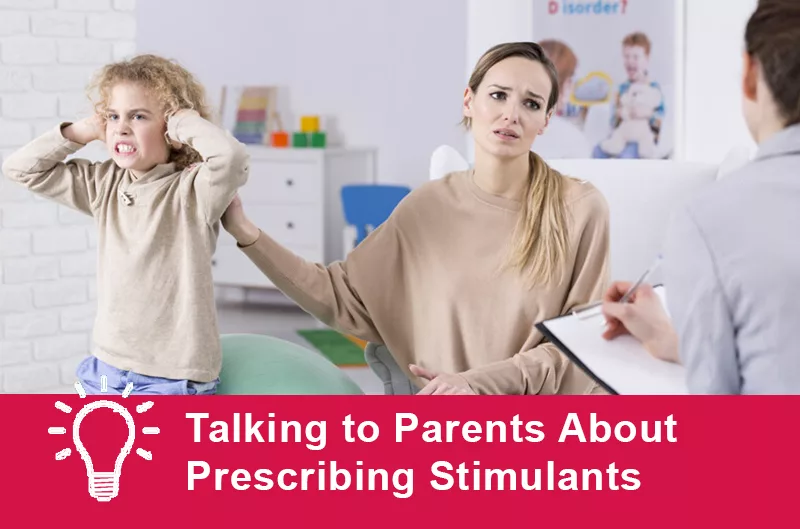Home » Talking to Parents About Prescribing Stimulants
Talking to Parents About Prescribing Stimulants

May 26, 2019
Because they work better than anything else to help kids focus, stimulant medications are standard treatments for ADHD. But when you suggest prescribing these medications, typically parents have questions and concerns, says Caroline Fisher, PhD, MD, Chief of Child Psychiatry at Samaritan Health Systems in Corvallis, OR.
In an article she wrote for The Carlat Child Psychiatry Report, Dr. Fisher looks at some of the frequently asked questions she gets from parents on stimulants, and gives some suggested answers you can use:
“Don’t stimulants cause growth stunting?” The research is mixed as to whether kids on stimulants have any permanent decrease in height (Vitiello B, Child Adolesc Psychiatr Clin N Am 2008;17(2):459–474). But tell parents that “as long as children on stimulants can maintain their body weight by eating enough, they grow normally.” Most parents will then respond, “Okay, I can feed them—I know how to do that.”
“I’ve heard that stimulants cause heart problems.” In almost all cases of cardiac complications, the problem has been when children have increased their doses quickly from very low to very high. Tell parents that there are very few cases of children who have developed cardiac problems on properly monitored doses. Reassure them that, in a large Florida study of 55,000 children conducted over 10 years, none of the children on stimulants died from a heart attack (Winterstein AG et al., Pediatrics 2007;120(6):e1494–1501). That being said, ask if patients have had a history of cardiac problems before starting stimulants, and if so, order an EKG.
“Won’t they cause my kid to be a zombie?” Some kids become sedated and zombie-like on ADHD medications. Although this is not uncommon, it is dose and situation related. Tell parents that the nice thing about a stimulant is that you can lower the dose (e.g., during less busy activities), or stop it, and no harm has been done.
“Aren’t stimulants addictive?” Tell parents "stimulants are just not as interesting to use as street drugs." Extended release formulations make it so you just can’t get high quickly, and high doses just don’t feel good to most kids. There is a withdrawal syndrome in which kids can get grouchy or headachy, but this is the same kind of withdrawal people have when they stop using caffeine. Kids with ADHD who take stimulants make better decisions and are actually less likely to abuse street drugs.
Subscribers can read the full article in The Carlat Child Psychiatry Report.
General PsychiatryIn an article she wrote for The Carlat Child Psychiatry Report, Dr. Fisher looks at some of the frequently asked questions she gets from parents on stimulants, and gives some suggested answers you can use:
“Don’t stimulants cause growth stunting?” The research is mixed as to whether kids on stimulants have any permanent decrease in height (Vitiello B, Child Adolesc Psychiatr Clin N Am 2008;17(2):459–474). But tell parents that “as long as children on stimulants can maintain their body weight by eating enough, they grow normally.” Most parents will then respond, “Okay, I can feed them—I know how to do that.”
“I’ve heard that stimulants cause heart problems.” In almost all cases of cardiac complications, the problem has been when children have increased their doses quickly from very low to very high. Tell parents that there are very few cases of children who have developed cardiac problems on properly monitored doses. Reassure them that, in a large Florida study of 55,000 children conducted over 10 years, none of the children on stimulants died from a heart attack (Winterstein AG et al., Pediatrics 2007;120(6):e1494–1501). That being said, ask if patients have had a history of cardiac problems before starting stimulants, and if so, order an EKG.
“Won’t they cause my kid to be a zombie?” Some kids become sedated and zombie-like on ADHD medications. Although this is not uncommon, it is dose and situation related. Tell parents that the nice thing about a stimulant is that you can lower the dose (e.g., during less busy activities), or stop it, and no harm has been done.
“Aren’t stimulants addictive?” Tell parents "stimulants are just not as interesting to use as street drugs." Extended release formulations make it so you just can’t get high quickly, and high doses just don’t feel good to most kids. There is a withdrawal syndrome in which kids can get grouchy or headachy, but this is the same kind of withdrawal people have when they stop using caffeine. Kids with ADHD who take stimulants make better decisions and are actually less likely to abuse street drugs.
Subscribers can read the full article in The Carlat Child Psychiatry Report.
Carlat Total Access Subscriptions: Get access to every article on the website.
Recommended
Newsletters
Please see our Terms and Conditions, Privacy Policy, Subscription Agreement, Use of Cookies, and Hardware/Software Requirements to view our website.
© 2026 Carlat Publishing, LLC and Affiliates, All Rights Reserved.

_-The-Breakthrough-Antipsychotic-That-Could-Change-Everything.webp?t=1729528747)



